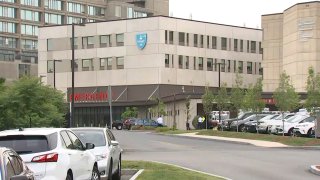
CORRECTION: In a prior version of this story, NBC10 Boston inadvertently presented a complaint from the class action lawsuit against Salem Hospital as facts that were publicly admitted by the hospital. We stated that the hospital admitted to operating with dirty endoscopic tools that were meant to be thrown away after a single use. That is an allegation made in the class action lawsuit not an admission by the hospital.
Patients of Salem Hospital are filing a class-action lawsuit after at least 450 of them were exposed to HIV and hepatitis due to bad practices in administering IV medications.
Mass General Brigham, which owns the hospital, publicly disclosed the problem earlier this week and said impacted patients were already informed. The practice was limited to a group of endoscopy patients, according to the health care group, and covered a period of about two years.
The lawsuit, filed by Keches Law Group on behalf of some of those patients, is against Mass General Brigham, Salem Hospital and 10 hospital employees. The impacted patients are now undergoing screening tests to check for Hepatitis B, Hepatitis C, and HIV, which could all cause lifelong impacts. The screening process can take several months or even years, the lawsuit claims.
Get New England news, weather forecasts and entertainment stories to your inbox. Sign up for NECN newsletters.
The lawsuit names the plaintiff as Melinda Cashman, but attorney Jonathan Sweet said they are in touch with 15 more patients.
The complaint centers around the claim that the hospital and its employees were negligent in its policies and procedures when administering IV medications, which could now mean lifelong health issues for those affected. It also claims emotional distress.
"The negligent acts of the Defendants have caused and continue to cause the Plaintiff and the putative class to suffer permanent injuries, including additional testing and extreme anxiety and emotional distress and decreased quality of life as a result of being exposed or potentially being exposed to an infection and, potentially, suffering a serious infection," the complaint reads.
Cashman said the news sent her into a spiral of confusion and anxiety.
"My brain went into 800 different places and I couldn’t stop figuring it out. Would I need a kidney or a liver transplant? Or an infection that requires me to not be around anymore. And I’m the sole caregiver for my parents," she told NBC10 Boston.
Sweet claims that the hospital used an endoscopic tool that’s meant to be single-use multiple times, potentially transmitting the disease. He said he expects the number of patients involved in the suit to increase and claimed that the hospital has been "disorganized" in its follow-up with patients.
A Mass General Brigham spokesperson said Saturday that to date, no infections have been reported, and that the practice involved one single contracted individual who no longer works at Salem Hospital. The hospital self-reported the concerns to the state Department of Health.
The spokesperson confirmed they are reviewing the lawsuit.
Salem Hospital issued the following statement earlier in the week:
"Earlier this year, Salem Hospital was made aware of an isolated practice involving a small portion of endoscopy patients who were potentially exposed to infection due to the administration of their intravenous medication in a manner not consistent with our best practice. Once identified, the practice was immediately corrected, and the hospital’s quality and infection control teams were notified."
"After a comprehensive review, including feedback from public health officials at the Massachusetts Department of Public Health (DPH), we have determined that the infection risk to patients from this event is extremely small. Salem Hospital has notified all potentially impacted patients, set up a clinician-staffed hotline to answer questions, and we are providing them with free screening and any necessary support. There is no evidence to date of any infections resulting from this incident."
"The safety of our patients is our highest priority and we have undertaken multiple corrective actions in response to this event. We sincerely apologize to those who have been impacted and we remain committed to delivering high-quality, compassionate health care to our community."